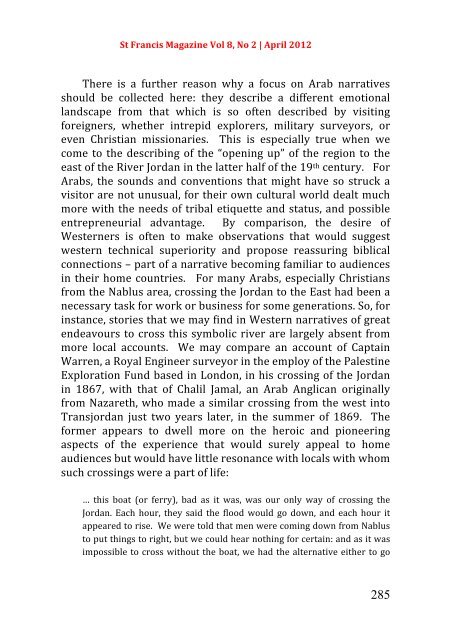Untitled - St.Francis Magazine
Untitled - St.Francis Magazine
Untitled - St.Francis Magazine
Create successful ePaper yourself
Turn your PDF publications into a flip-book with our unique Google optimized e-Paper software.
<strong>St</strong> <strong>Francis</strong> <strong>Magazine</strong> Vol 8, No 2 | April 2012 There is a further reason why a focus on Arab narratives should be collected here: they describe a different emotional landscape from that which is so often described by visiting foreigners, whether intrepid explorers, military surveyors, or even Christian missionaries. This is especially true when we come to the describing of the “opening up” of the region to the east of the River Jordan in the latter half of the 19 th century. For Arabs, the sounds and conventions that might have so struck a visitor are not unusual, for their own cultural world dealt much more with the needs of tribal etiquette and status, and possible entrepreneurial advantage. By comparison, the desire of Westerners is often to make observations that would suggest western technical superiority and propose reassuring biblical connections – part of a narrative becoming familiar to audiences in their home countries. For many Arabs, especially Christians from the Nablus area, crossing the Jordan to the East had been a necessary task for work or business for some generations. So, for instance, stories that we may find in Western narratives of great endeavours to cross this symbolic river are largely absent from more local accounts. We may compare an account of Captain Warren, a Royal Engineer surveyor in the employ of the Palestine Exploration Fund based in London, in his crossing of the Jordan in 1867, with that of Chalil Jamal, an Arab Anglican originally from Nazareth, who made a similar crossing from the west into Transjordan just two years later, in the summer of 1869. The former appears to dwell more on the heroic and pioneering aspects of the experience that would surely appeal to home audiences but would have little resonance with locals with whom such crossings were a part of life: … this boat (or ferry), bad as it was, was our only way of crossing the Jordan. Each hour, they said the flood would go down, and each hour it appeared to rise. We were told that men were coming down from Nablus to put things to right, but we could hear nothing for certain: and as it was impossible to cross without the boat, we had the alternative either to go 285







![Reflections on Surah Fatiha and the Lord's Prayer[1] - St.Francis ...](https://img.yumpu.com/49377951/1/184x260/reflections-on-surah-fatiha-and-the-lords-prayer1-stfrancis-.jpg?quality=85)








